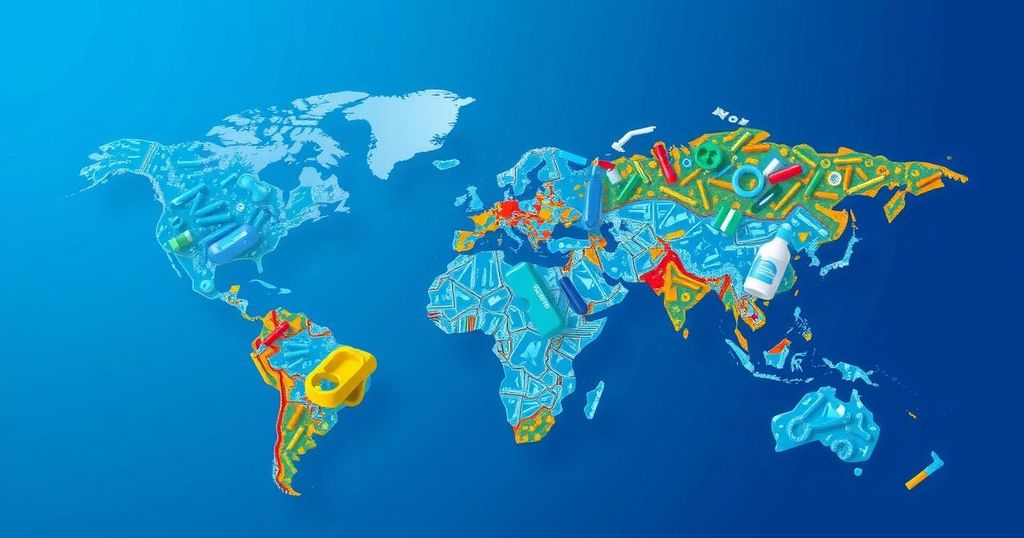Countries warned of obstruction by oil-producing nations at UN talks in Busan aimed at establishing a global treaty against plastic pollution. Key issues include production reduction targets and phasing out harmful chemicals. Concerns about delays and lack of consensus persist, with over 100 countries supporting stronger commitments, despite the absence of the world’s top plastic producers, China and the US.
During the fifth session of the UN Intergovernmental Negotiating Committee on Plastic Pollution held in Busan, South Korea, numerous nations expressed concern regarding obstructionist behaviors exhibited by a small group of states. These nations, primarily oil producers, have been resistant to compromise on essential aspects of a global treaty aimed at reducing plastic pollution. Key contentious issues include quantifiable targets for decreased plastic production and the elimination of hazardous chemicals.
France’s Energy Minister Olga Givernet articulated the prevailing apprehension, stating, “We also are worried by the continuing obstruction by the so-called like-minded countries.” It is imperative to achieve an ambitious agreement, especially given that plastic production is projected to triple by the year 2060, with a staggering 90 percent of plastics currently going unrecycled. Despite the consensus on the seriousness of plastic pollution, nations differ significantly on the strategies required to address it.
Countries such as Saudi Arabia and Russia advocate for measures that concentrate solely on plastic waste, dismissing proposals that entail binding global restrictions. Their steadfast position has been clearly documented throughout the negotiations but has gone largely unchallenged. Rwandan delegate Juliet Kabera lamented the impasse, noting, “It is disappointing to see that a small number of members remain unsupportive of the measures necessary to drive real change.”
As negotiations were set to conclude, the latest draft presented reflected persistent divisions among the delegates. Concerns were raised regarding a potential collapse of talks, which could necessitate future meetings in different locations. Environmental groups have urged nations in favor of ambitious commitments to consider voting as a means to overcome stagnation. However, French delegate Maria Joao Teixeira fears that such a move might alienate supportive countries.
Amidst this discourse, Mexico’s head of delegation, Camila Zepeda, reaffirmed a commitment to consensus-building over voting, encapsulating the negotiators’ aspirations for collaboration. Despite the challenges presented by the current negotiations, over 100 nations endorse specific production cut targets, while several advocate for the prohibition of certain chemicals and superfluous plastic items. Yet, the absence of representatives from both China and the United States, the two leading producers of plastics, at crucial discussions raises concerns regarding future global commitments. Panama’s Juan Carlos Monterrey Gomez poignantly remarked that failing to reach a strong treaty would have lasting repercussions.
The article discusses the ongoing UN negotiations concerning a global treaty to address plastic pollution, which have reached a critical juncture. This session, known as INC-5, took place in Busan, South Korea, and represents two years of discussions aimed at creating binding commitments to regulate plastic production and phase out harmful chemicals. The slow and contentious nature of the negotiations reflects broader geopolitical tensions and the struggle to align disparate national interests in the face of a growing global environmental crisis.
In summary, the UN negotiations on plastic pollution in Busan revealed significant challenges posed by obstructionist states, primarily oil-producing nations, resisting critical treaty provisions. With mounting calls for decisive action against rising plastic production, delegates expressed urgency in reaching a robust agreement. The pathway toward a sustainable and comprehensive treaty remains fraught with disagreements, highlighting the complexities inherent in global environmental governance as nations seek to navigate both economic interests and environmental imperatives.
Original Source: jordantimes.com






